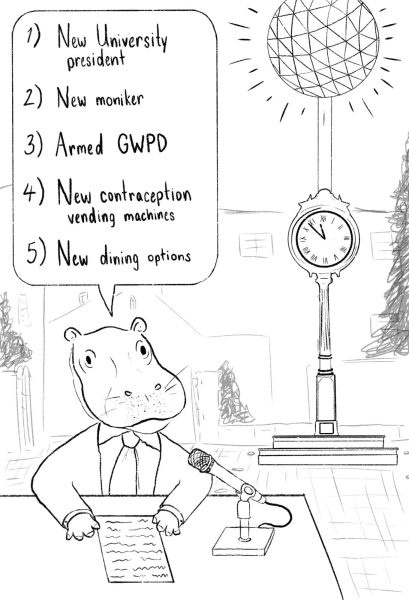If one word could sum up 2023 at GW, it would be “revolutionary.” The University gained a new president and a new moniker, introduced and implemented sometimes controversial policies, continued to transform on-campus dining, and much, much more in a little less than 12 months. To put it simply, this was a year of change.
As the semester winds down, the editorial board is looking back on the year that was 2023. Here’s what went well, what didn’t and what resolutions GW can set for itself in 2024.
Let’s touch on some of this year’s more successful stories. It may not be flashy, but officials’ decision to install a contraceptive vending machine in the University Student Center in January expanded students’ access to contraceptives at a time when reproductive health care is increasingly under threat in the U.S. GW installed two more vending machines on campus in District House and West Hall in August, a reminder that student advocacy really can make a difference.
It was also a big year for the culinary connoisseurs on campus. Shenkman Hall’s dining space opened in January, GW fully transitioned to its new meal swipe system and new places to eat have popped up in District House, the recently renovated student center and Western Market. But budgeting dining dollars and now meal swipes remains as difficult as ever.
And who can forget where they were Sept. 6? That day, GW sheltered in place after a homicide suspect escaped police custody at GW Hospital, setting off a flurry of emergency alerts. (In case you missed it, police finally caught their suspect in October.)
Despite the memes, campus security was a major theme this year. Then-University President Mark Wrighton announced the University would arm some GW Police Department officers with handguns in April, receiving pushback from students and faculty. Ensuring the safety and security of the University community is no easy task, yet it’s hard to see how locked and loaded GWPD officers play — or have played — a positive role in doing so.

And then came October. At vigils, protests and demonstrations during and since that month, GW has grappled with grief and sorrow, fear and anger, and the complexities that come with regulating free speech at a private institution. Should GW stick to the sidelines like a referee or jump into the fray with a volley of statements? That’s the question facing University President Ellen Granberg and college administrators across the country.
If 2023 was a year of changes, it also had its fair share of challenges: Making sense of GW’s history, charting a course for its future, figuring out the roles and responsibilities of a university, and lately confronting hurtful speech and harassment. No one ever said higher education was supposed to be simple.
There’s plenty GW could do next year with enough time, money and willingness, like closing the gender pay gap between female professors and their male counterparts or hiring more mental health professionals. Plus, a dash of compassion and a bit of understanding would do well to lower the temperature of a campus that still feels like it’s simmering in anger.
So, as the new year looms, let’s resolve ourselves to find strength and support in one another. For our part, the editorial board remains committed to taking a hard look at GW, D.C. and the world we live in. The past 202 years have made GW what it is today. Here’s to all that the next one has in store.
The editorial board consists of Hatchet staff members and operates separately from the newsroom. This week’s staff editorial was written by Editorials Assistant Paige Baratta and Opinions Editor Ethan Benn based on discussions with Contributing Culture Editor Jenna Baer, Contributing Social Media Director Anaya Bhatt, Contributing Opinions Editor Riley Goodfellow and Social Media Director Ethan Valliath.


